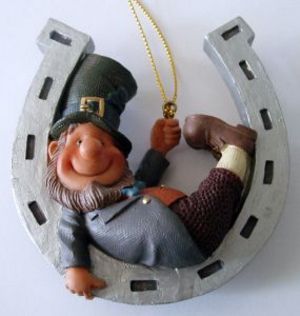Have you ever been warned you’ll grow up to be an old biddy? Ever taken the cake? And did you know that those sayings became a part of the English language thanks to the Irish? Keep reading to discover the meanings of these and other commonly used Irish phrases.
Wail of the banshee – Irish folklore says that the Banshee (a fairy woman) wails or “keens” to announce a mortal person’s death. To keen is to lament and the Banshee only keens for those whose names begin with ‘Mac/Mc’ or ‘O’. Her cries can be heard from Ireland to America and she follows those who were true Irish no matter where they go.
Beyond the Pale– Is a term that means unacceptable or unreasonable. The word Pale refers to those parts of the Ireland that England controlled. Eventually the Pale disappeared when England took complete control of the island. An example using the phrase would be: The way she acted at the party today was beyond the pale.
Kiss the blarney stone – Blarney means to smooth talk, it also means that whatever you are saying is nonsense. A blarney stone is a stone that is built into the battlement on top of the tower of Blarney Castle in county Cork. Irish traditions say that if you go to Blarney Castle and kiss the blarney stone you’ll be given the gift of gab, the master of persuasion and be a charismatic speaker.
Potluck – To the Irish, a potluck was a meal with no particular menu. Everyone participating brought a dish for all to share. The term comes from a time when groups of Irish women would gather together and cook dinner. They only had one pot so they cooked the meal together with whatever ingredients they happened to have that day.
Biddy – The term biddy came about during the wave of Irish immigration to America. Jobs were hard to come by for the Irish so many of the women became maids. The term biddy was adapted to describe the job. Nowadays we think of an old biddy as an old lonely woman that owns 23 cats.
Mick – This is derogatory slang for “Irishman,” Mick was another term picked up during Irish immigration. Many Irishmen who came to America were named Michael so to shorten it they were dubbed mick and because there were tons of Irish immigrating at the same time, all were lumped in the same category and called micks.
Tying the knot –Is a term that means getting married, you are engaged. It comes from the Celtic tradition of handfasting where the hands of an engaged couple were tied together to show their commitment to each other while they agreed upon a marriage contract. The contract was commonly made valid for a year and a day rather than a lifetime.
Paddy Wagon – The Americans began calling Irishmen Paddy when they started leaving Ireland in the droves and showed up in America in large numbers. This is similar to the term mick. The nickname Paddy was considered an insult by both the Americans who used it and the Irish who were shamed with it. Paddy was derived from the common Irish name Patrick thus today we have St. Paddy’s Day instead of St. Patrick’s Day. The Irish had a reputation for being drunken and unruly. They were often carted off by police in a horse-drawn wagon and later a 1925 Studebaker. These came to be known as “paddy wagons”
Taking the Cake – One Irish custom dates back to the days of cake dances on summer evenings. Local musicians and residents gathered at a crossroads and threw a party. Someone always brought a cake that would be displayed on a white table cloth draped over a milk churn. Everyone danced and partied the night away. At some point in the party a winner would be declared and given the cake. The winner then shared the cake with everyone else.
Luck of the Irish – This is one phrase that everyone knows but what everyone doesn’t know is that this term started out as an insult. It referred to the bad luck the Irish seemed to have following them during the potato famine. The Irish who immigrated to America during this time were thought to be lower than negro slaves to the point that local businesses put up signs saying “No Irish Need Apply” while negros were welcome to apply. The Irish were thought to be lazy, stupid, ignorant, savage, drunken idiots so when something good did come their way it was automatically considered to be luck. No one thought the Irish could accomplish anything.
Eventually the original contempt behind the phrase was lost and became known to mean that the Irish are a happy, charmed race of people who are quite lucky.
